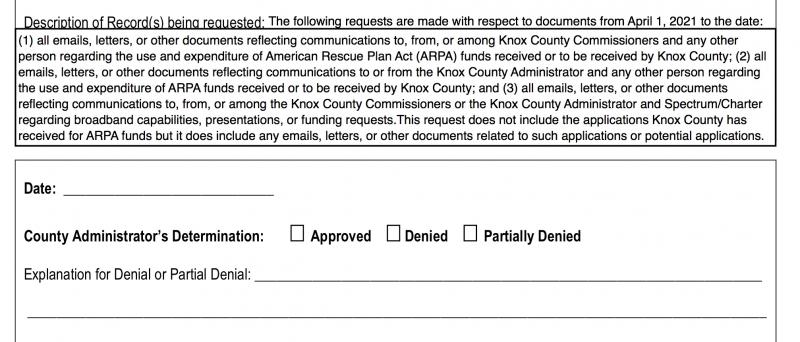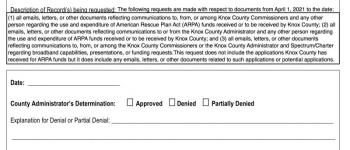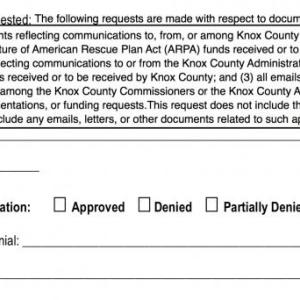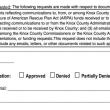Cushing and Hope citizens press Knox County Commissioners with freedom of access requests
MIDCOAST — The tense and acrimonious energy at play during an Oct. 12 meeting of the Knox County Commissioners Meeting continues to reverberate throughout various Midcoast municipalities, with some towns subsequently sending letters of disapproval, and two citizens submitting requests for information under Maine’s Freedom of Access Act.
On Oct. 14, Craig Currie, a Cushing Select Board member, emailed Knox County Administrator Andrew Hart, asking whether the county planned to post all 58 applications for a share of a $7.7 million federal funding package on the county’s website.
Hart answered Currie in an email, saying: “We will not be posting each application as there is an excessive amount of pages per application and we had a total of 58 applications. We do have a spreadsheet.”
The funding package in question is Knox County’s share of the massive $1.9 trillion American Rescue Plan Act of 2021, more simply referred to in meetings across the country, as “ARPA.”
Of that $1.9 trillion, $130 billion was to be directed to local governments.
Currie submitted an Oct. 20 Freedom of Access Act request to the Knox County Commissioners, asking for: “A copy (digital preferred) of each application for ARPA funding submitted to Knox County. This requests includes every ARPA application submitted to Knox County, including any and all exhibits accompanying these applications.”
Currie said he filed his FOAA as a citizen, not on behalf of the Cushing Select Board.
Hart told this reporter Oct. 22 that all the applications are available for review in person. The Knox County Administrative Offices are in the Knox County Court House, 62 Union Street, in Rockland.
“The applications are available for review at the Administrative Office,” he said.
Currie said: “I know most other towns/entities filed them via email electronically. To me these are public documents and I want to see them to see how our grant requests stacked up against others.”
He added: “As you know, the county commissioners unanimously voted not to consider any town specific grants in their Oct 12 meeting despite never issuing that criteria when we all made our applications. That was very frustrating to us.”
The Oct. 12 Commissioners’ meeting was fraught with accusations following a request by Commissioner Dorothy Meriwether, who asked Chairman Richard Parent, Jr., to suspend public comment on any broadband-related issue.
Broadband had become a flashpoint in the ongoing conversations with the Knox County Commissioners, with some municipalities requesting a portion of the $7.7 million be appropriated for establishing more comprehensive internet service to citizens. Other requests for funding were made by nonprofits and municipalities for housing, homelessness, and food distribution to the needy.
Broadband, of which there were several requests from different towns, received a low priority.
But the meeting devolved into a display of harsh sentiments when any public comment concerning broadband was banned. Adding fuel to the fire was the the appearance of a representative from Spectrum/Charter Communications, a national corporation that currently is one of several internet service providers in the Midcoast.
Charter Communications, Inc., (NASDAQ:CHTR) is a broadband connectivity company and cable operator serving more than 31 million customers in 41 states through its Spectrum brand, according to the company’s self description.
Citizens at the meeting expressed concerns that Spectrum would be giving an informational presentation. Commissioner Meriwether said following the meeting that Spectrum had approached the commissioners about getting on the agenda. The purpose was to provide an overview of the company’s services and discuss low-income broadband services, according to a Spectrum spokesperson.
Following the meeting, Meriwether circulated a letter outlining her position on broadband funding.
“I want to be very, very clear. I am not against high-speed broadband,” she wrote. “Far from it. It is as critical as any infrastructure in our county and country. But it is my job as a commissioner to help prioritize our decisions about the most immediate use for the limited funds we have.”
She said that the funding requests totaled $12 million.
But towns rebuked the commissioners for their fiscal decision making, and their meeting process.
“There is no authority to prohibit content from being presented in the Public Comment section,” wrote Camden Attorney Bill Kelly, and Thomaston Attorney Paul Gibbons, in a joint letter. “The express prohibition of allowing Knox County residents from speaking is not just poor judgment, but a violation of the Freedom of Access Act and procedural process on a constitutional level.”
On Oct. 20, the Cushing Select Board also expressed their dismay in an official letter, after having watched a recording of the meeting. View the meeting here.
They asked for responses to three points (see attached PDF for complete letter)
“Why did you omit the criteria from the original grant request process that you had no intention of funding ANY town specific grants,” they asked. “Cushing submitted three requests and we could argue that two of the there had bigger regional benefits than just Cushing (public access to the St. George River and broadband through a regional utility) yet they were summarily rejected at your first grant meeting. Why did you reach out to all Knox county towns to submit grants when you had no plans to fund any of them?”
They also wrote: “There seemed to be several unethical and possibly unconstitutional breaches during the meeting and the general tone towards the citizens of this county who attended was shameful. Do you plan to apologize and correct these issues in further meetings?”
Meanwhile, in Hope, the chair of that town’s municipal broadband committee was also preparing a FOAA. Like Currie, Melissa Hall said she had submitted her FOAA as a citizen, and was not representing her committee or town.
In her FOAA request (See attached PDF), Hall asked for all communications to and from the commissioners and county administrator and any other person regarding the use and expenditure of ARPA funds, and all communications between the commissioners and administrator, and Spectrum/Charter Communications regarding broadband capabilities, presentations or funding requests.
Hall said Oct. 22 in a phone conversation that she is fairly new to the community, but got involved with the broadband effort across the Midcoast because she works from home on the computer, and has children who were schooled remotely last year.
“I have been following the Knox County Commissioners proceedings on the ARPA funding process, as there are many issues and causes that seem pressing in our communities right now, and that fall under the federal government's guidelines for its use,” she wrote to Commissioners in her Oct. 21 FOAA submission.
“I am in disbelief of the way the Commission has run their recent meetings and treated residents of their County,” she added.
On Oct. 22, she said that more transparency concerning the Knox County ARPA distribution process is necessary.
At the Oct. 12 meeting, Meriwether was adamant about no broadband consideration, “and yet Spectrum was sitting there talking about giving low cost solutions,” said Hall.
Hall continued: “I don’t think speaking to Spectrum and buddying up to one of the corporations didn’t look fair or unbiased, and just makes me wonder.”
On October 22, Hart acknowledged receipt of the two FOAAs and referred questions to Knox County Attorney Peter Marchesi, who is with Wheeler & Arey, P.A. in Waterville.
“These matters have been referred to the county’s legal counsel and Knox County has no comment at the present time,” said Hart.
Meanwhile, in Camden, the Select Board unanimously agreed at its Oct. 19 board meeting to proceed with its own strong letter to the Commissioners. The board members discussed broadly their disappointment with the Oct. 12 meeting, which many watched either while it was in progress, or after.
“It was an incredibly frustrating meeting,” said Camden Town Manager Audra Caler.
She said the distribution of the $7.7 million should be a function of the county’s elected Budget Committee officials, not left in the hands of three Commissioners.
The Budget Committee members, “have not been included in decisions to date,” said Caler.
She said that Maine county government, in general and unlike in other states across the country, is not responsible for infrastructure and planning services, tasks that generally fall on municipalities.
“Knox County received $7.7 million and a lot of the counties across the state proportionately received the same amount of money,” she said. “That’s a great model in states where the counties have much more responsibily than what people typically associate with the counties in Maine. But the counties in Maine don’t do a lot of those things, like providing infrastructure and planning services, and a lot of things in Maine people rely on municipalities for. So, having so much money go to the counties when they don’t perform a lot of the functions that that funding was designed to fund, has put the county in a position where they are trying to find out the best use of them.”
The county called for a request for proposals for the funds, said Caler.
While Camden didn’t put in anything specifically, she said, the town supports Rockport’s $750,000 request for broadband expansion throughout the towns, and is working with Rockland and Thomaston toward the same goals.
Matt Siegel, a Camden Select Board member who also serves the town as a director in the recently created public utility, the Midcoast Internet Development Corporation, was at the Oct. 12 commissioners meeting, and involved in the various debates there. Sophie Romana was also at the meeting.
“I was amazed by the number of people who took time off in the middle of the day to share their concerns, comments and proposal with the county and were shocked that they wouldn’t be heard,” said Romana.
Camden Select Board member Alison McKellar said: “It was a little staggering to watch, no matter how you think those funds are going to spent.”
At their Oct. 19 Select Board meeting, the Camden Select Board members commented on Knox County governance itself.
“Camden is the highest contributor dollar wise to the county,” said board chair Bob Falciani. “It’s not small change; it’s $2.6 million. The proposed budget for Knox County this year will reflect a 10 percent increase over last year.”
The board members agreed that just three commissioners directing the disbursement of $7.7 million across the county without employing the help of the county’s Budget Committee was a misguided approach.
“There could be a two-to-one vote,” said Attorney Kelly, who was at the board’s Oct. 19 meeting, pointing out the governmental processes of a three-member board.
As for the temperature of the meeting, Falciani said: “I don’t think there was any rationale. I think it was emotional and it was one of the worst lead meetings.”
“The Commissioners have received enormous amounts of information but none of it is public,” said Romana. “It is easy to put into on a website, make it public and transparent. They have decided not to do this.”
In the end, the board unanimously approved sending its letter to the County Commissioners, “regarding the Midcoast internet situation and the spending of the funds,” as the motion read.
Reach Editorial Director Lynda Clancy at lyndaclancy@penbaypilot.com; 207-706-6657





























